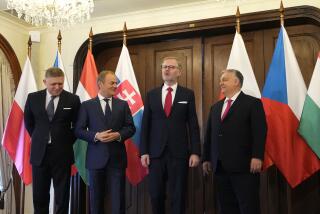Bosnia ‘No-Fly Zone,’ Arms Embargo Left Up to U.N.
- Share via
STOCKHOLM — European and North American foreign ministers on Tuesday expressed “horror and dismay” at the brutal Yugoslav ethnic war. But they stopped short of recommending an end to the Bosnia-Herzegovina arms embargo, which has crippled the Muslim-led government’s attempt to defend itself.
In a hotly debated communique that delayed adjournment for an hour and a half, the Conference on Security and Cooperation in Europe urged the U.N. Security Council to “urgently consider” shooting down Serbian warplanes violating the Bosnia “no-fly zone.”
But the 51-nation organization recommended only that the United Nations discuss easing the arms embargo without suggesting an outcome.
Meanwhile, in Brussels, the North Atlantic Treaty Organization agreed to start contingency planning for use of military force in Bosnia and other former Yugoslav republics. The NATO action was in response to a request by U.N. Secretary General Boutros Boutros-Ghali to draw up a plan, in case the world body endorsed military measures in the former Yugoslavia.
But Secretary of State Lawrence S. Eagleburger and British Foreign Secretary Douglas Hurd both minimized the significance of the NATO decision. Talking to reporters in Stockholm, both men emphasized that military organizations often draw up such plans without acting on them.
“I don’t think you can expect from that (that) there’s the likelihood of massive military intervention,” Eagleburger said. “If the killing and the horror in Bosnia goes on . . . I don’t suppose the civilized world can stand back and watch it without thinking about what more can be done.” But he added: “I don’t think you should expect that NATO or some other military entity is going to invade Yugoslavia with thousands of troops. No, that’s not going to happen.”
The CSCE decision to pass the issue of the Bosnia arms embargo on to the Security Council without recommendation echoed the American position, which is that the matter should be studied.
But it disappointed Bosnian representatives who had hoped for more. The embargo applies to all former Yugoslav republics, but the Serb side is far better armed than its foes.
“We were entitled to expect more as our people are dying, being killed or frozen to death,” Bosnian Foreign Minister Haris Silajdzic told reporters. “But I think this is a positive agreement. It is absurd to have our hands tied while we’re being massacred.”
Bosnia is a member of the conference, which includes all European countries, the United States and Canada. The Serb-dominated rump Yugoslavia is a member but its participation has been suspended.
The CSCE communique was firmer on enforcing a ban of military aircraft--which only Serbia and its allies possess--over Bosnia. It said the Security Council should “urgently consider taking the relevant decisions” to enforce the no-fly zone. The council voted in October to create such a zone without specifying what happens to those who violate its ban, as the United Nations says Serbian warplanes have done more than 200 times in just over two months.
The United States and France support enforcement of the ban. But Britain, also a veto-carrying permanent member of the Security Council, is reluctant to go along.
In London, British Prime Minister John Major told Parliament: “We need to weigh the desirability of enforcing the no-fly zone against the possible impact of that on U.N. humanitarian efforts and the safety of our own troops. If enforcement of the no-fly zone put the U.N. operation at risk, the main losers might well be the people of Bosnia, and we need to consider that carefully before a decision is reached.”
Major’s statement was in reply to Labor Party leader John Smith, who has warned of “appalling suffering” in the region.
Times staff writer William Tuohy in London contributed to this report.
More to Read
Sign up for Essential California
The most important California stories and recommendations in your inbox every morning.
You may occasionally receive promotional content from the Los Angeles Times.










